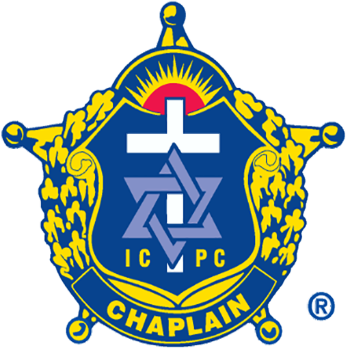ICPC CANON OF ETHICS FOR THE LAW ENFORCEMENT CHAPLAIN
- The Law Enforcement Chaplain is foremost a member of the clergy and not an officer of the law. If a Chaplain does happen to be a sworn officer as well as a chaplain, he or she must make certain that everyone understands which role he or she is fulfilling at any given time, always conducting himself or herself in an ethical and professional manner. Departmental requirements for reporting matters up the chain of command and the necessity for confidentiality in communication with the chaplain make this imperative.
- The Law Enforcement Chaplain shall be, and continue in good standing to be, a member of his or her faith group clergy. Any change in such status must immediately be reported to Departmental authorities and to the International Conference of Police Chaplains.
- The Law Enforcement Chaplain serves in a multi-faith capacity. He or she is not to use the chaplaincy to proselytize or to preach in order to win adherents to his or her faith group. It shall be assumed that the Law Enforcement Chaplain shall be familiar with the beliefs and practices of the various faith groups represented in his or her Department. It shall further be assumed that the Law Enforcement Chaplain is familiar with the requirements of honesty, integrity, humility, compassion, decency, brotherhood, humanity and love that are overarching concepts among faith groups.
- The Law Enforcement Chaplain shall not hesitate to seek guidance either from Departmental authorities or clergy of other faith groups when such guidance becomes necessary to the proper discharge of chaplaincy duties.
- The Law Enforcement Chaplain may from time to time face situations involving members of his or her general community. The chaplain is to discharge his or her duties in such situations with due regard for any Departmental policies and procedures that may obtain in such circumstances. The chaplain is still a member of the clergy and as such may be of service to the entire community as long as he or she does not infringe upon the ministry of another member of the clergy and does not improperly involve his or her Department by such service.
- It cannot be stressed too strongly that the Law Enforcement Chaplain shall maintain the confidentiality of those who seek his or her guidance and counsel as a chaplain. The Law Enforcement Chaplain shall become familiar with the laws governing confidentiality that obtain in his or her state, province, territory or nation.
- The Law Enforcement Chaplain shall be aware of Departmental regulations concerning favors, gifts and gratuities and follow them rigorously. He or she shall not give or receive any favor, gift or gratuity that has, or has the appearance of having, a basis in special consideration. He or she shall always conduct himself or herself in an ethical and professional manner.
- The Law Enforcement Chaplain shall not lend his or her presence to any political or social movement in any manner that may suggest departmental endorsement of such a movement. Any such endorsement or advocacy must be undertaken only as a civilian member of the clergy. Political and social movements are clearly distinguishable from civic office. As citizens, Law Enforcement Chaplains may and do hold public office either by election or appointment. At all times, however, the role of public servant must be held distinct from the role of clergy.
- The Law Enforcement Chaplain shall maintain timely and accurate records of any resources put at his or her disposal for the exercise of the chaplaincy ministry and be ready at all times to render an account of such resources to the appropriate authority or authorities.
